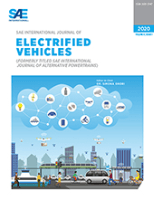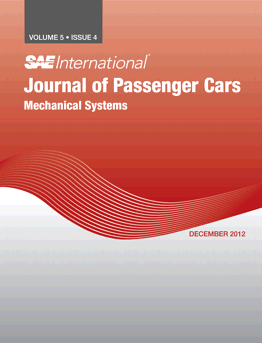
eTransportation
Scope & Guideline
Pioneering the Future of Sustainable Mobility
Introduction
Aims and Scopes
- Electric Vehicle Technologies:
Researching advancements in electric vehicle technologies, including battery systems, fuel cells, and hybrid systems to improve efficiency, performance, and safety. - Battery Management and Safety:
Focusing on battery management systems, state-of-health estimation, thermal management, and safety mechanisms to enhance the reliability and lifespan of battery systems. - Energy Management and Optimization:
Exploring energy management strategies for electric vehicles, including vehicle-to-grid (V2G) interactions, charging infrastructure planning, and energy optimization in multi-modal transport systems. - Environmental Impact and Sustainability:
Investigating the environmental implications of electric transportation, including lifecycle assessments, recycling of batteries, and integration of renewable energy sources. - Advanced Materials and Design:
Researching new materials and design methodologies for battery technologies, including solid-state batteries, novel electrolytes, and advanced cooling systems. - Modeling and Simulation:
Employing advanced modeling and simulation techniques to understand and predict the behavior of electric vehicle systems, including thermal dynamics, electrochemical processes, and mechanical interactions.
Trending and Emerging
- Smart Charging Solutions and Infrastructure:
There is a growing focus on smart charging solutions that optimize charging times and energy distribution, incorporating AI and machine learning for improved efficiency and grid integration. - Battery Second-Life Applications:
Research on the second-life applications of batteries, particularly retired lithium-ion batteries for energy storage systems, is gaining attention as a strategy for sustainability and resource management. - Hydrogen Fuel Cell Technologies:
The exploration of hydrogen fuel cells as a viable alternative to conventional batteries for electric vehicles is trending, particularly for their potential in long-range transportation and heavy-duty applications. - Safety and Reliability in Battery Systems:
An increasing emphasis on safety and reliability mechanisms in battery systems, including thermal runaway prevention and fire suppression strategies, is emerging as critical due to the growing prevalence of electric vehicles. - Integration of Renewable Energy Sources:
Research focusing on the integration of renewable energy sources with electric transportation systems, including vehicle-to-grid solutions and smart grid technologies, is becoming more prominent.
Declining or Waning
- Traditional Internal Combustion Engine Technologies:
As electric vehicles gain traction, research focused on traditional internal combustion engines and their optimization is becoming less prevalent in the journal. - Basic Battery Chemistry Studies:
Research that primarily focuses on basic battery chemistry without practical applications or advancements in technology is decreasing as the field moves towards more applied and innovative approaches. - Single-Use Battery Applications:
The exploration of non-recyclable, single-use battery applications is declining in favor of sustainable and circular economy approaches that focus on battery reuse and recycling. - Generalized Energy Storage Solutions:
Research on generalized energy storage solutions without specific applications to electric vehicles or transportation systems is waning as the journal emphasizes targeted advancements in electric mobility. - Non-Electric Transportation Systems:
The focus on non-electric transportation systems, such as traditional rail or gas-powered vehicles, is diminishing as the journal increasingly centers on electric and hybrid systems.
Similar Journals

BRAZILIAN JOURNAL OF CHEMICAL ENGINEERING
Advancing the Frontiers of Chemical Engineering ResearchThe Brazilian Journal of Chemical Engineering (ISSN: 0104-6632, E-ISSN: 1678-4383), published by Springer Heidelberg, stands as a prominent open-access journal dedicated to disseminating innovative research and advancements in chemical engineering since its inception in 1997. With a commitment to enhancing knowledge exchange within the field, this journal is indexed in Scopus, earning a respectable Q3 rank in the category of General Chemical Engineering as of 2023. It provides a platform for researchers, professionals, and students to explore a diverse range of topics, fostering collaboration and innovation from its base in Brazil. The journal has converged its operations from 1995 and will continue to push the boundaries of chemical engineering research until 2024 and beyond. As a critical resource for up-to-date methodologies and emerging trends, the Brazilian Journal of Chemical Engineering is essential for those aiming to make impactful contributions in this dynamic and evolving field.

Vehicles is a pioneering open access journal published by MDPI since 2019, dedicated to advancing knowledge in the fields of Automotive Engineering and Electrical and Electronic Engineering. Based in Switzerland, the journal provides a valuable platform for researchers, professionals, and students to disseminate high-quality, peer-reviewed research across essential areas of vehicle technology and innovation. With an impressive Q2 ranking in both Automotive Engineering and Electrical and Electronic Engineering as of 2023, and a notable placement in the Scopus rankings (Rank #37/125 and #320/797, respectively), Vehicles plays a critical role in fostering collaboration and knowledge exchange within these fast-evolving disciplines. Through its commitment to Open Access, Vehicles ensures that cutting-edge research is accessible to a global audience, thereby contributing significantly to the collective understanding and development of sustainable transportation solutions. Situated at the crossroads of engineering innovation and practical application, Vehicles invites contributions that explore contemporary challenges and promote transformative advancements in the automotive sector.

Automotive Innovation
Unleashing the Power of Innovation in TransportationAutomotive Innovation is a leading academic journal dedicated to the advancements and transformative trends in the field of automotive engineering. Published by SpringerNature, this esteemed journal boasts an impressive Q1 ranking in Automotive Engineering for 2023, reflecting its high impact and relevance with a rank of #17 out of 125 in the Scopus database, placing it in the 86th percentile. Focused on publishing cutting-edge research from 2018 to 2024, it serves as an essential platform for researchers, professionals, and students interested in exploring the latest innovations, technologies, and practices in automotive design, manufacturing, and sustainability. Though not an open access journal, its commitment to advancing knowledge in automotive engineering makes it an invaluable resource for anyone invested in the future of transportation. For further insights and research findings, the journal can be accessed at its editorial office located in the United States.

Smart Grids and Sustainable Energy
Bridging Technology and SustainabilitySmart Grids and Sustainable Energy, published by SPRINGER NATURE, is a pivotal open-access journal dedicated to advancing the knowledge and application of smart grid technologies and sustainable energy solutions. Serving as a key resource in the fields of Economics and Econometrics, Electrical and Electronic Engineering, and Energy Studies, this journal aims to facilitate interdisciplinary collaboration and innovation. With a commendable Q2 ranking in multiple categories as of 2023, including a top percentile placement in Economics and Econometrics and Electrical Engineering, the journal underscores its significance in driving forward research that combines economic viability with technological advancement. Researchers, professionals, and students will find a wealth of scholarly articles designed to expand understanding of the complex interplay between energy systems, sustainability, and economic factors. For those interested in cutting-edge research with high visibility due to its open-access policy, Smart Grids and Sustainable Energy is an essential addition to the academic landscape.

International Journal of Power and Energy Systems
Illuminating the Future of Power SystemsInternational Journal of Power and Energy Systems, published by ACTA PRESS, serves as a vital platform for research and discourse in the multifaceted fields of applied mathematics, electrical and electronic engineering, and energy engineering. With an ISSN of 1078-3466 and an E-ISSN of 1710-2243, this journal covers a broad spectrum of topics pertinent to power and energy systems, showcasing innovative research from its inception in 1996 through to its projected contributions in 2024. Operating from Calgary, Canada, the journal, though not currently open access, provides invaluable insights into the challenges and advancements within these domains, as reflected in its categorization in the Q4 quartile across multiple indices. Despite being positioned in lower output percentiles in 2023 rankings on Scopus—specifically, #212 in Energy Engineering and Power Technology—it remains a critical resource for scholars seeking to expand the frontiers of knowledge in energy sustainability and system efficiency. Researchers, professionals, and students alike will find the journal’s commitment to fostering academic dialogue and disseminating pioneering results both essential and inspiring.

TRANSPORTATION
Connecting Research with Real-World Transportation ChallengesTRANSPORTATION is a premier academic journal published by Springer, focusing on the dynamic and interdisciplinary field of transportation studies. Established in 1972 and set to release its latest findings through 2024, the journal has garnered a strong reputation, reflected in its impressive impact factor and Q1 quartile rankings across key categories including Civil and Structural Engineering, Development, and Transportation. With a robust Scopus ranking that places it in the top percentile of its fields (ranked #16/306 in Social Sciences - Development, #27/379 in Engineering - Civil and Structural Engineering, and #23/141 in Social Sciences - Transportation), "TRANSPORTATION" is crucial for researchers, professionals, and students alike who seek to expand their understanding of innovative transport systems, policies, and technologies. By offering in-depth research articles, reviews, and case studies, the journal serves as a vital resource for advancing academic knowledge and practical solutions in the transportation sector. Part of a thriving academic community, contributors and readers alike are encouraged to engage with the latest research to foster development in pressing issues related to mobility and infrastructure.

SAE International Journal of Electrified Vehicles
Exploring the Frontiers of Electric Vehicle EngineeringSAE International Journal of Electrified Vehicles, published by SAE International, is a pioneering journal dedicated to the field of electrified transportation. Operating since 2020, this journal offers a crucial platform for researchers, engineers, and practitioners who are at the forefront of advancements in vehicle electrification and related technologies. With an ISSN of 2691-3747 and an E-ISSN of 2691-3755, it is indexed within respected databases, showcasing its commitment to high-quality research in Automotive Engineering and Fuel Technology. As part of the Q3 category in the 2023 rankings for both automotive and energy sectors, the journal facilitates the exchange of innovative ideas and groundbreaking studies that contribute to the evolution of the electrified vehicle industry. While currently not open access, the journal offers various subscription options for readers, making valuable insights accessible to a broad audience. Conducting research in this dynamic field, the SAE International Journal of Electrified Vehicles is vital for professionals striving to push the boundaries of technology and sustainability in modern transportation.

INTERNATIONAL JOURNAL OF AUTOMOTIVE TECHNOLOGY
Connecting Global Minds in Automotive TechnologyINTERNATIONAL JOURNAL OF AUTOMOTIVE TECHNOLOGY, published by the Korean Society of Automotive Engineers (KSAE), stands as a key platform in the field of Automotive Engineering since its inception in 2000. With an ISSN of 1229-9138 and an E-ISSN of 1976-3832, this esteemed journal aims to disseminate cutting-edge research, innovative methodologies, and advancements in automotive technology. As of 2023, it holds a distinguished Q2 quartile ranking in the Automotive Engineering category on Scopus, featuring a competitive rank of 48/125, illustrating its recognition among peers and the academic community. The journal also enjoys a global readership despite its base in South Korea. Researchers, professionals, and students in the automotive sector are encouraged to contribute to this journal, thus promoting collaboration and knowledge exchange that fosters innovation and progress in automotive engineering. Additionally, the journal is committed to enhancing accessibility of knowledge across boundaries and aims to continue serving as a catalyst for academic growth up to the year 2024.

Ingineria Automobilului
Exploring the Frontiers of Automotive Design and SafetyIngineria Automobilului is a prominent journal dedicated to advancing knowledge in the field of automotive engineering. Published by the SOC AUTOMOTIVE ENGINEERS ROMANIA, this journal serves as a vital platform for the dissemination of high-quality research, innovative methodologies, and groundbreaking applications in automotive technology. With an ISSN of 1842-4074, it provides an essential resource for researchers, professionals, and students who are committed to the development and enhancement of automotive systems. Although the journal currently does not offer open access, its contributions are crucial for ongoing advancements in automotive design, safety, and sustainability. The publication aims to foster collaboration between academia and industry, emphasizing the importance of interdisciplinary approaches in solving complex challenges facing the automotive sector today. By facilitating discussions on emerging technologies and engineering practices, Ingineria Automobilului continues to play a pivotal role in shaping the future of automotive engineering.

SAE International Journal of Passenger Cars-Mechanical Systems
Exploring the Future of Passenger Car DynamicsSAE International Journal of Passenger Cars-Mechanical Systems, published by SAE International, serves as a vital platform for researchers, engineers, and industry professionals focused on the dynamics of passenger vehicle mechanical systems. With an ISSN of 1946-3995 and E-ISSN of 1946-4002, this journal bridges academic research with practical applications in the automotive field. Although coverage in Scopus was discontinued after 2021, the journal has still contributed significantly to the realms of automotive engineering, safety, and mechanical engineering, evidenced by its Scopus rankings and percentiles across various categories, including a rank of #57 in Automotive Engineering. This multidisciplinary journal is key for those looking to advance their knowledge and explore innovative solutions in automotive mechanics, with an emphasis on enhancing vehicle performance, reliability, and safety. While current open access options are detailed further on their website, the journal continues to maintain a commitment to disseminating valuable insights that can shape future automotive technologies and practices.